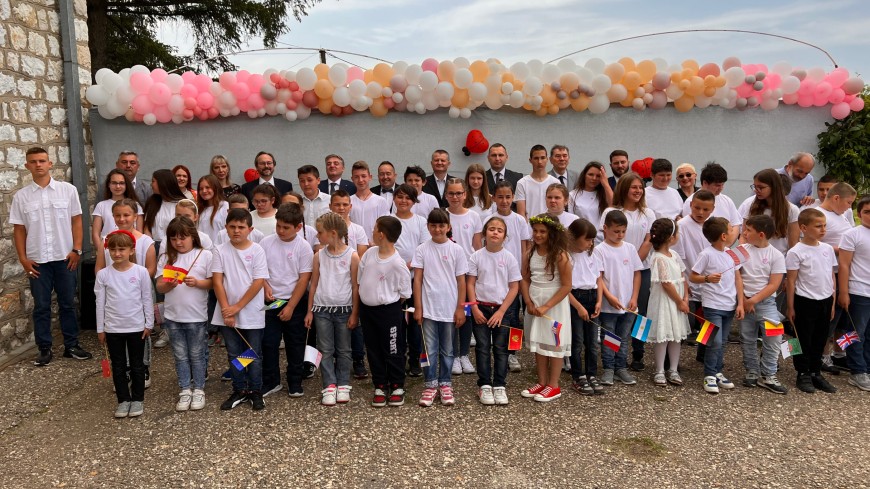Local community, parents, students and school staff gathered today to mark Day of Democratic Culture in the elementary school “Veljko Dugošević” in Turija. The goal of the Day was to promote critical thinking, gender equality and cultural diversity and to reiterate the genuine value of the democratic culture for this local community.
“Tolerance, respect, equality, freedom of expression - these are the words of democracy, words that stand for values based on respecting and being respected. Democracy is what safeguards and protects our freedoms – freedom to live, learn, think, say, love, work and make choices and the earlier we start teaching about them, the better”, said Ambassador of the EU to Serbia, Emanuele Giaufret and added that 59 schools across Serbia are taking part in the action ”Quality education for all”, financed by the EU and Council of Europe. “The EU has invested in many projects across all levels of education in Serbia – more than 100 million EUR has been dedicated to increasing the quality, inclusiveness and relevance of education”, concluded Giaufret.
The elementary school “Veljko Dugošević” is one of 59 schools across Serbia that benefit from the joint European Union/Council of Europe “Quality education for all” action and mark the Days of Democratic Culture in May-June. This is their fifth year developing competences for democratic culture, first as a pilot school in a joint EU/Council of Europe action “Fostering a democratic school culture”, and now as a mentor school with a new role that includes guiding and directing other schools in the process of competences for democratic culture development.
“The Day of Democratic Culture organised in 59 schools across Serbia is a true celebration of democracy. By fostering values, skills and attitudes that promote diversity, tolerance and intercultural understanding, schools create a safe and productive environment of equality and prosperity,” said Tobias Flessenkemper, Head of the Council of Europe Office in Belgrade. “And what we saw today is remarkable - teachers, students, parents and local community acting in synergy and placing the school at the heart of the development of their society, by working to ensure quality education for all to the benefit of the country and its people”, added Flessenkemper noting that the school “Veljko Dugošević” has already demonstrated its dedication to European values when it opened the Council of Europe library back in 2019.
Marking of the Day of Democratic Culture was an opportunity for students to showcase how they put democratic competences into practice. They presented a smartphone application that promotes democratic competences; the application development was just one example many activities the schools are carrying out as part of the action.
“The framework of competences is now in the official Education Strategy 2030, which testifies to the commitment and ambition of our Ministry to include specific values and attitudes systematically in the education system, which will further strengthen schools and children and parents and local communities. This is especially important for our European path, and therefore I thank the European Union and the Council of Europe once again for its continuous support…That is why I am especially glad that we can see and hear what and how the school is doing in order to integrate these democratic values into its daily teaching and extracurricular activities,” said professor Ivica Radović, State Secretary in the Ministry of Education, Science and Technological Development of the Republic of Serbia.
The action “Quality education for all” is implemented under the joint European Union/Council of Europe programme “Horizontal Facility for the Western Balkans and Turkey 2019-2022”.





